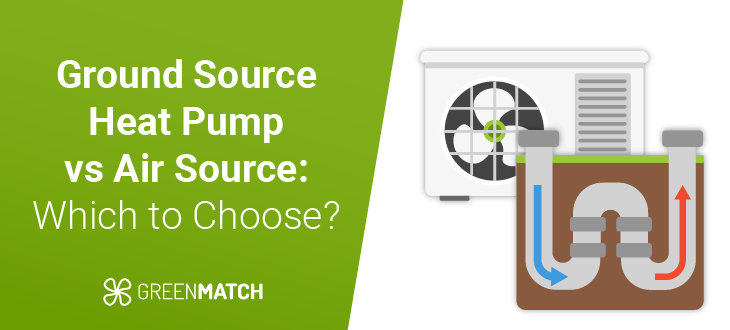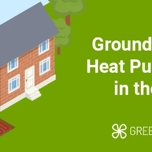Answer these simple questions and we will find you the BEST prices
Which type of solar quotes do you need?
It only takes 30 seconds
100% free with no obligation

Get up to 4 quotes by filling in only 1 quick form

Install a heat pump for less with the BUS grant

We’ve helped over 500,000 homeowners reduce their carbon footprint
- GreenMatch
- Compare
- types
- Ground Source Heat Pump vs Air Source
Ground Source Heat Pump vs Air Source: Which to Choose?


In the event of purchasing or replacing a heat pump, the following question might come to mind: ground source heat pumps vs air source heat pumps, which one is better?
Heat pumps are fueled by a small amount of electricity and draw out the heat from the air or ground in order to distribute it around your home where it can be used for central heating or to heat water for domestic use. Therefore, they are known for their efficiency and lower fuel costs. However, the question remains, which type of heat pump is more convenient and better suited for your home?
Before going into detail as to which are the main differences and advantages between air and ground source heat pumps, firstly, it is important to go through the basics when it comes to heat pumps. Naturally, heat flows from a higher to a lower temperature. However, heat pumps are able to force the heat flow in the opposite direction, using a small amount of high-quality drive energy, such as electricity, fuel, or high-temperature waste heat.
This is how heat pumps are able to transfer heat from natural sources in the surroundings (air, ground, and water) to a household or industrial building.
Heat pumps have a cooling function as well. In this case, heat is sent in the opposite direction, from the device where it is cooled, into the outdoors at a higher temperature. In some cases, the excess heat made up from cooling is used to meet simultaneous heat demand. In addition to this, it is also worth considering that both ground and air source heat pumps are eligible for payments through multiple heat pump grants from the UK government.
Making up your mind on choosing between an air source heat pump vs a ground source heat pump can be a pretty nerve-wracking task. In order to save you from the pain of spending an excessive amount of time doing the hard work by yourself, GreenMatch can help you by offering up to 4 completely free-of-charge quotes by connecting you with our network of professional installers. Click the form below to start the process:
- Quotes from local engineers
- Payment by finance available
- Save £7,500 with BUS grant
It only takes 30 seconds



Ground source vs air source: the complete breakdown
In the event of choosing between a ground source heat pump (GSHP) and an air source heat pump (ASHP), there are several factors to take into account, such as the running costs, how much available space will be taken, and the efficiency rating.
It is also important to consider that each particular project presents different characteristics and that the choice between an air or ground source heat pump will ultimately depend on personal preferences and circumstances. For this reason, it is highly recommended to get in contact with a professional advisor.
Physical differences between both systems
Ground source heat pumps
Ground source heat pumps (GSHPs), also known as geothermal heat pumps, are renewable energy technologies that allow for a high level of efficiency due to their ability to concentrate the existing heat rather than produce it themselves from a variety of sources, namely from the ground, groundwater and water from the surface. This allows them to use between 25% to 50% less electricity than their more conventional heating or cooling counterparts.
As their name suggests, ground source heat pumps are installed in the ground, while air source heat pumps are installed either inside or outside the house. This makes the installation procedure for GSHPs more costly and complex than for ASHPs, requiring additional workload and time, resulting in higher installation costs.
However, GSHPs use a ground loop or a ground source heat pump borehole in order to extract heat from the ground. This allows them to have the advantage of a constant temperature available all through winter if and only if the ground loop is big enough. For larger buildings, the alternatives can also be attractive, including open-loop systems that extract heat from open water or an aquifer system:
- Water source heat pumps.
- Marine source heat pumps.
There is the possibility of exchanging heat with the outside air, however, an air source heat pump is less efficient when the outdoor temperature is low. In the UK, 40% of the CO2 emissions derive from the heating and cooling of properties, thus the government is looking to implement sustainable and environmentally friendly technology such as heat pumps.
All in all, despite their complex installation procedure, GSHPs present a series of advantages that include a higher efficiency than ASHPs by providing stable temperatures throughout the year, compared to the fluctuating temperature of the air. In addition, they are also a cost-effective and environmentally friendly alternative to fossil fuels.
Hence, this is why is it worth considering upgrading your heating and cooling system to a ground source heat pump, taking advantage of government initiatives such as the Boiler Upgrade Scheme, which aims to encourage homeowners in England and Wales to install low-carbon heating systems, providing grants of £7,500 to cover the installation costs for ground source heat pumps.
The video below explains how a ground source heat pump works:

Like every piece of hardware, the ground source system should be covered by an annual maintenance agreement with your supplier. It should be said that routine maintenance requirements are very low given the fact that the life expectancy of such a heat pump is over 20 years (longer than a combustion boiler) – whilst the ground heat exchanger should be expected to last for at least 50 years.
Suppose you’re seeking to lower your utility bills in light of the current eye-watering energy prices, while simultaneously reducing your carbon footprint. In that case, it is in your own interest to upgrade your home heating or cooling system, with air or ground source heat pumps potentially being the best option for you.
In order to take away the pain of researching and comparing different types of heat pump systems all by yourself, GreenMatch is here to help you by providing up to 4 completely free-of-charge quotes from our network of professional installers. Click the button below to swiftly start the process:
- Quotes from local engineers
- Payment by finance available
- Save £7,500 with BUS grant
It only takes 30 seconds



Air Source heat pumps
Similarly to ground source heat pumps, this classification of heat pumps can also provide efficient heating and cooling for your home with a small amount of electricity, transferring the heat rather than obtaining it by burning fossil fuels and thus becoming an environmentally friendly option by not emitting carbon dioxide or any type of gas. Air source heat pumps in the UK however do not provide hot water, unlike ground source heat pumps which are able to.
Air source heat pumps (ASHP) are usually placed outdoors at the property's side or back, requiring a much less complex and lengthy installation procedure than for GSHPs. The heat is taken from the air and boosted to a higher temperature using a heat pump. Although the pump requires electricity in order to run, it should use less electrical energy than the heat it produces.
Most of the ASHPs on the market are eligible for payment through the Boiler Upgrade Scheme, which provides up to £7,500 off cost and installation. Air source heat pumps represent 87% of heat pump units in the UK and are the most sought-after option among heat pumps. This is also because air source heat pumps are great for both retrofits and new builds.
The interactive graphic below illustrates how the process works. You can click each point to read about the steps in more detail:
Air to water heat pumps work much better with underfloor heating systems. If this system is not accessible, large radiators are recommended. This is required due to the fact that the heat developed by the heat pump is not as high as that delivered by a conventional boiler, thus a bigger surface area is needed to achieve identical temperatures in your household.
They are better suited for brand new properties given that air source heat pump costs can be deducted if the heat pump is part of the building specification, rather than having to modify the underfloor heating later on. It is essential that your house is insulated, otherwise the heat the pump is generating escapes more easily.
The video below explains how an air source heat pump works:

If your budget does not allow you too much room for comfort, ASHPs are known to be cheaper than ground source heat pumps. The estimated cost of installing a typical air source heat pump is somewhere between 8,000 and 18,000 pounds.
The payback period varies from user to user. Firstly, it depends on how efficiently your system works, how you will be using the heat generated by the pump, the type of system you are replacing, and whether you can get money from the Boiler Upgrade Scheme.
For example, The Energy Saving Trust estimates that an ordinary performing air source heat pump in an average 4-bedroom home could save:
- -£55 - £650 a year if replacing oil.
- £700 - £1,200 a year if replacing electric heating.
The Boiler Upgrade Scheme would also pay an extra £805 - £1,280 a year if the appropriate air source heat pump is used.
There are 2 main types of ASHPs:
- Air to water heat pumps – heat from the outside air is fed to your central heating system. As the heat produced is cooler than that from a conventional boiler, you may need to install larger radiators or underfloor heating in your home.
- Air to air heat pumps – takes heat from the outside air and feed into your home through fans. This type of system, unfortunately, cannot produce hot water.
Both of the systems mentioned above require very little maintenance. You may also want to consider solar PV panels for a greener source of electricity if the area in which you live is suitable.
ASHPs can help lower the carbon footprint that your household produces due to the fact that they use a renewable, natural source of heat. The amount of CO2 emissions you will end up saving depends on the fuel you are replacing it with. For example, it will be higher when replacing electric heating rather than natural gas.
In conclusion, whichever source of heat pump you choose, we at GreenMatch are here to help you make the best decision for your personal circumstances and most importantly your budget, preventing you from the pain of researching for hours. Just fill out the form below and get up to 4 different quotes. It is free and with no obligation:
- Quotes from local engineers
- Payment by finance available
- Save £7,500 with BUS grant
It only takes 30 seconds



Which system is cheaper?
Due to the installation process, ASHPs have an advantage in comparison to GSHPs, with the latter resulting in higher costs. To install an ASHP, the procedure is simpler and less labour-intensive, whereas, on the other hand, GSHPs are more complex and can take longer due to the amount of work involved.
The price difference between the two, which largely depends on factors such as the size of your home, location and the hypothetical need of changing the heat distribution throughout your home, varies between £8,750-£14,050 for ASHPs, while the cost for GSHPs ranges from £13,200-£19,000. Although thanks to the Boiler Upgrade Scheme, these costs can be reduced by £5,000, or £6,000 (depending on the type of system you install).
| Air Source Heat Pump | Ground Source Heat Pump | |
|---|---|---|
| Price range (exc. installation) | £8,750 - £14,050 | £13,200 - £19,000 |
| Boiler Upgrade Scheme | £7,500 | £7,500 |
With this in mind, costs can vary regularly, therefore we highly recommend speaking to a specialist in the field in order to assess your circumstances and give you a tailored recommendation on which type of heat pump is best suited for your home.
Even if ASHPs do result in lower costs, they do require more frequent efficiency checks than GSHPs. This can act as a deterrent, however, it is estimated that the difference in maintenance costs between the two is not significant. ASHPs are in general less expensive to install and maintain, but GSHPs last longer and rank better in efficiency.
Luckily for you, GreenMatch can help you find your best deal by offering up to 4 completely free-of-charge quotes from local heating engineers to save you from the pain of doing the hard work all by yourself. Click on the link below to start the process and get in contact with our network of professional installers to find the best solution for your home:
- Quotes from local engineers
- Payment by finance available
- Save £7,500 with BUS grant
It only takes 30 seconds



Space requirements of both systems
When it comes to the installation of GSHPs, the process is considered to be a complex one, since it requires digging up the ground to install the ground loops, either vertically or horizontally. Regardless of whether you opt for a vertical or horizontal system, a significant amount of workload and space will be necessary, making GSHPs a costly investment.
On the other hand, ASHPs are quicker and simpler to install without the need of digging up the ground, unlike their GSHP counterparts, easily adapting to both new and existing homes. These heat pumps can easily be installed on the wall or directly on the ground due to their smaller size and easier installation requirements.
Which system is more efficient?
Air source heat pumps are a very efficient option to heat and cool your home, being able to reach efficiencies of over 400%. In comparison, more traditional heating systems that use gas, oil, or propane as fuel have efficiencies that vary between 80-97%.This level of efficiency is possible thanks to their ability to transfer heat rather than produce it from fuel.
However, despite all of these advantages, the efficiency of air source heat pumps varies across the seasons, becoming less efficient during the cold winter temperatures. Ground source heat pumps have a much more stable source of heat that doesn’t depend on the outside temperature as much, leading them to have an approximate 450% efficiency all year round.
Which system is quieter?
Both ground source and air source heat pumps make some noise, but heat pumps are usually quieter than fossil fuel boilers. The noise level of a ground source heat pump is about 42 decibels, which is similar to a typical domestic refrigerator, while an air source heat pump can reach between 40 to 60 decibels depending on the manufacturer and installation.
Ground source heat pumps are generally quieter compared to air source heat pumps overall as they are located underground and they don’t have to work too hard to pull heat from the ground. Nevertheless, If you’re looking to choose between an air or ground source heat pump, your decision shouldn’t be influenced by noise levels alone.
Summary: Which heat pump is right for my home?
Overall, whether you choose an air or ground source heat pump, either option is a good choice to heat or cool your home.
However, when it comes to the nitty gritty, it is important to consider factors such as the physical differences between both systems, the costs, the amount of space required and efficiency throughout the year among other factors.
| Advantages Air Source Heat Pump | Disadvantages Air Source Heat Pumps | Advantages Ground Source Heat Pumps | Disadvantages Ground Source Heat Pumps |
|---|---|---|---|
| Allows for a lower carbon footprint | Less efficient than GSHPs | More efficient due to being less susceptible to outside temperatures | Long payback period |
| Cheaper installation costs | Requires good house insullation to retain heat | Requires less maintenance once installed | Higher upfront costs |
| Easier to install inside or outside the house | Requires more maintenance than GSHPs | Longer durability | Limited suitability becoming a better option for newbuilds |
As the table above shows, ASHPs are a great option if you are looking for a cheaper and adaptable system for your home, since they do not require a lot of space or a complex installation procedure and can easily adapt to old-build properties. However, their efficiency is weakened during the winter months since they are susceptible to low temperatures.
Although air source heat pumps can still be cost-effective during the UK’s cold weather, they work best in more moderate climates. According to the Energy Saving Trust, there are some times during the year when air source heat pumps will fare better in efficiency than the ground source heat pump, but when it gets really cold, the latter is more efficient.
On the other hand, GSHPs are more expensive and require more space, planification and a complex installation. Despite this, they are more stable, last longer, are less noisy and more efficient, since their source of heat is not as affected by external factors such as low temperatures, making them very cost-effective in the long run.
All in all, there is no doubt that the final decision will depend on your personal circumstances, therefore GreenMatch offers you up to 4 free and non-binding quotes from our network of professional providers so you don’t miss out on informed decision-making that will allow you to compare different options and prices to choose the best option for your home. Click the link below to start the process:
- Quotes from local engineers
- Payment by finance available
- Save £7,500 with BUS grant
It only takes 30 seconds



FAQ
Generally speaking, ASHPs are less expensive and require less space for installation. On the other hand, GSHPs are more efficient in cold temperatures and last longer than their counterparts. Moreover, in a contest where air source heat pumps vs ground source heat pumps compete against each other, there is no definite answer, since both have their benefits and drawbacks.
Air source heat pumps can be more efficient than ground source heat pumps in moderate climates, however, ground source heat pumps are more efficient in very cold temperatures. Ultimately, the efficiency of both systems will depend on the circumstances, including climate, available space, budget and personal preferences. It is recommended to get in contact with a professional before making a final decision.
The cost of air source heat pumps oscillates between £8,000 to £18,000 and for ground source heat pumps it can go from £14,500 to £45,000. During the process of upgrading your heating or cooling system, it is also worth considering government schemes that can help you cover the costs, such as the Boiler Upgrade Scheme.
Air source heat pumps remain efficient during winters in the UK since typically temperatures do not drop far below 0°C. However, they do start to function slightly worse in temperatures lower than 0°C.

Alejandro is a copywriter at GreenMatch and is passionate about European environmental policy and renewable energy. He has conducted research on the European Green Deal’s impact on EU energy policy and climate adaptation, and he is committed to using his writing skills to promote sustainable policies.
We strive to connect our customers with the right product and supplier. Would you like to be part of GreenMatch?




